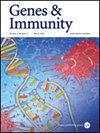与急性心肌梗塞免疫浸润相关的潜在凝血相关诊断模型。
IF 4.5
3区 医学
Q1 GENETICS & HEREDITY
引用次数: 0
摘要
促凝血因子的产生会影响急性心肌梗死(AMI)的发生和预后。为了发现诊断和治疗急性心肌梗死的新靶点,我们对凝血相关基因(CRGs)的临床价值进行了研究。我们基于 GSE66360 数据集筛选了 335 个 AMI 和健康人之间的差异表达基因(DEGs)。我们将获得的 DEGs 与 139 个 CRGs 相交。最后,我们筛选出了 10 个差异表达的 CEG。我们采用随机森林算法确定了 6 个特征 CRG(THBS1、SERPINA1、THBD、MMP9、MAFF 和 PLAU)。随后,发现所建立的预测模型具有良好的诊断准确性(训练队列 [GSE66360 数据集] 中的 AUC = 0.9694,外部验证队列 [GSE48060 数据集] 中的 AUC = 0.9076)。共识聚类确定了 CRG 聚类,并验证了分组的准确性。我们发现,根据差异表达的 CRGs,AMI 患者可分为两个不同的亚组。根据单样本基因组富集分析,免疫细胞浸润水平与 CRGs 的表达水平一致。这些发现揭示了 CRGs 在 AMI 中的潜在作用。鉴定急性心肌梗死患者的凝血特征有助于对患者进行风险分层,并提供个性化的治疗策略。本文章由计算机程序翻译,如有差异,请以英文原文为准。

A potential coagulation-related diagnostic model associated with immune infiltration for acute myocardial infarction
The production of pro-coagulation factors can affect the development and prognosis of acute myocardial infarction (AMI). The clinical value of coagulation-related genes (CRGs) was investigated to discover new targets for diagnosing and treating AMI. We screened 335 differentially expressed genes (DEGs) between AMI and healthy individuals based on the GSE66360 dataset. We took the intersection of the obtained DEGs with 139 CRGs. Finally, 10 differentially expressed CEGs were screened out. The random forest algorithm was constructed to identify 6 signature CRGs (THBS1, SERPINA1, THBD, MMP9, MAFF, and PLAU). Subsequently, the established predictive model was found to have good diagnostic accuracy (AUC = 0.9694 in the training cohort [GSE66360 dataset] and 0.9076 in the external validation cohort [GSE48060 dataset]). Consensus clustering identified the CRG clusters, and the accuracy of the grouping was verified. We found that AMI patients can be divided into two distinct subgroups based on the differentially expressed CRGs. Immune cell infiltration level was consistent with the expression levels of CRGs based on single sample gene set enrichment analysis. These findings reveal the potential role of CRGs in AMI. Characterizing the coagulation features of AMI patients can help in the risk stratification of patients and provide personalized treatment strategies.
求助全文
通过发布文献求助,成功后即可免费获取论文全文。
去求助
来源期刊

Genes and immunity
医学-免疫学
CiteScore
8.90
自引率
4.00%
发文量
28
审稿时长
6-12 weeks
期刊介绍:
Genes & Immunity emphasizes studies investigating how genetic, genomic and functional variations affect immune cells and the immune system, and associated processes in the regulation of health and disease. It further highlights articles on the transcriptional and posttranslational control of gene products involved in signaling pathways regulating immune cells, and protective and destructive immune responses.
 求助内容:
求助内容: 应助结果提醒方式:
应助结果提醒方式:


